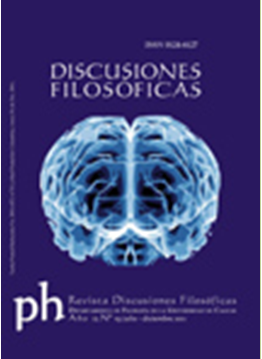Autores/as
Resumen
Generalmente, los que defienden la interpretación providencialista de la mano invisible de Adam Smith, sostienen que los individuos guiados por una mano invisible poseen ciertas cualidades que se espera se orientan a ciertos fines beneficiosos para la sociedad. Este sería, ni más ni menos, el sentido de la famosa expresión smitheana. En este artículo mostraré, por el contrario, que en el pasaje de la mano invisible de La teoría de los sentimientos morales los individuos guiados por una mano invisible no poseen las cualidades que se espera se orientan a dichos fines. Así, la interpretación providencialista no puede explicar qué cualidades poseen los terratenientes (los guiados por una mano invisible), de modo tal que se orienten al fin beneficioso en cuestión (la distribución de las cosas necesarias para la vida).
Citas
Alvey, J. Adam Smith: optimist or pessimist?: a new problem concerning the teleological basis of commercial society. Aldershot: Ashgate Publishing Limited, 2003. Print.
---. “The secret, natural theological foundation of Adam Smith’s work”. Journal of Markets and Morality 7. (2) 2004: 335-361. Print.
---. “The ‘new view’ of Adam Smith and the development of his views over time”. G. Cockfield, A. Firth & J. Laurent. New perspectives on Adam Smith’s The Theory of moral sentiments. Cheltenham: Edward Elgar, 2007. Print.
Campbell, T. Adam Smith’s science of morals. London: Allen & Unwin, 1971. Print.
Clarke, P. “Unity in the influences on Adam Smith”. History of Economics Review 36. 2002: 10-25. Print.
Cropsey, J. Polity and Economy: an interpretation of the principles of Adam Smith. The Hague: Martinus Nijhoff, 1957. Print.
Denis, A. “The invisible hand of God in Adam Smith”. Research in the history of economic thought and methodology 23. (1) 2005: 1-32. Print.
Dwyer, J. The age of the passions: an interpretation of Adam Smith and Scottish enlightenment culture. East Linton: Tuckwell Press, 1998. Print.
Fitzgibbons, A. Adam Smith’s system of liberty, wealth, and virtue: The moral and political foundations of the wealth of nations. Oxford: Oxford University Press, 1995. Print.
Griswold, C. Adam Smith and the virtues of enlightenment. Cambridge: Cambridge University Press, 1999. Print.
Hill, L. “The hidden theology of Adam Smith”. European Journal of the History of Economic Thought 8. (1) 2001: 1-29. Print.
Kleer, R. “The Role of teleology in Adam Smith’s wealth of nations”. History of Economics Review 31. 2000: 14-29. Print.
Macfie, A. The individual in society. London: Allen & Unwin, 1967. Print.
Raphael, D. Adam Smith, past masters. Oxford: Oxford University Press, 1985. Print.
Schabas, Margaret. “Adam Smith’s debts to nature”. History of Political Economy 35. (1) 2003: 262-281. Print.
Sher, R. Church and university in the Scottish enlightenment. Edinburgh: Edinburgh University Press, 1985. Print.
Skinner, A. “Economic theory”. A. Broadie. The Cambridge companion to the Scottish enlightenment. Cambridge: Cambridge University Press, 2003. Print.
Smith, A. Correspondence of Adam Smith. Oxford: Oxford University Press, 1977. Print.
---. Lectures on Jurisprudence. Oxford: Oxford University Press, 1978. Print.
---. La teoría de los sentimientos morales. Madrid: Alianza, 1997. Impreso.
---. Investigación sobre la naturaleza y causas de la riqueza de las naciones. México: Fondo de Cultura Económica, 1999. Impreso.
Veblen, T. “The preconceptions of economic science”. The Quarterly Journal of Economics 13. (4) 1899: 396-426. Print.
Viner, J. “Adam Smith and laissez faire” The Journal of Political Economy 35. (2) 1927: 198-232. Print.
Vivenza, G. Adam Smith and the classics: the classical heritage in Adam Smith’s thought. Oxford: Oxford University Press, 2001. Print.

 PDF
PDF
 FLIP
FLIP





















